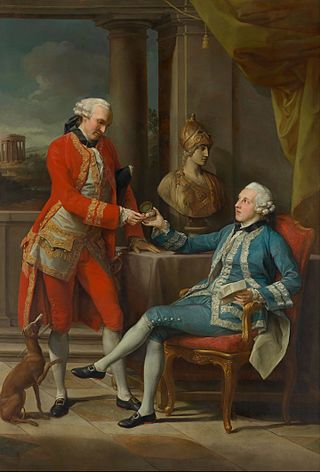Related Research Articles

Peerages in the United Kingdom form a legal system comprising both hereditary and lifetime titles, composed of various ranks, and within the framework of the Constitution of the United Kingdom form a constituent part of the legislative process and the British honours system. The British monarch is considered the fount of honour and is notionally the only person who can grant peerages, though there are many conventions about how this power is used, especially at the request of the British government. The term peerage can be used both collectively to refer to the entire body of titled nobility, and individually to refer to a specific title. British peerage title holders are termed peers of the Realm.
Lord is an appellation for a person or deity who has authority, control, or power over others, acting as a master, chief, or ruler. The appellation can also denote certain persons who hold a title of the peerage in the United Kingdom, or are entitled to courtesy titles. The collective "Lords" can refer to a group or body of peers.

Baron is a rank of nobility or title of honour, often hereditary, in various European countries, either current or historical. The female equivalent is baroness. Typically, the title denotes an aristocrat who ranks higher than a lord or knight, but lower than a viscount or count. Often, barons hold their fief – their lands and income – directly from the monarch. Barons are less often the vassals of other nobles. In many kingdoms, they were entitled to wear a smaller form of a crown called a coronet.

Thomas West, 3rd Baron De La Warr, was an English nobleman, for whom the bay, the river, and, consequently, a Native American people and U.S. state, all later called "Delaware", were named. A member of the House of Lords, from the death of his father in 1602 until his own death in 1618, he served as the governor of Virginia from 1610 to 1611.

The Right Honourable is an honorific style traditionally applied to certain persons and collective bodies in the United Kingdom, the former British Empire and the Commonwealth of Nations. The term is predominantly used today as a style associated with the holding of certain senior public offices in the United Kingdom, Canada, New Zealand, and, to a lesser extent, Australia.
Forms of address used in the United Kingdom are given below.

A Lord of Parliament was the holder of the lowest form of peerage, entitled as of right to take part in sessions of the pre-Union Parliament of Scotland. Since that Union in 1707, it has been the lowest rank of the Peerage of Scotland, ranking below a viscount. A Lord of Parliament is said to hold a Lordship of Parliament.

Lord of the manor is a title that, in Anglo-Saxon England and Norman England, referred to the landholder of a rural estate. The titles date to the English feudal system. The lord enjoyed manorial rights as well as seignory, the right to grant or draw benefit from the estate. The title is not a peerage or title of nobility but was a relationship to land and how it could be used and those living on the land (tenants) may be deployed, and the broad estate and its inhabitants administered. The title continues in modern England and Wales as a legally recognised form of property that can be held independently of its historical rights. It may belong entirely to one person or be a moiety shared with other people. The title is known as Breyr in Welsh.
False titles of nobility or royal title scams are claimed titles of social rank that have been fabricated or assumed by an individual or family without recognition by the authorities of a country in which titles of nobility exist or once existed. They have received an increasing amount of press attention, as more schemes that purport to confer or sell such honorifics are promoted on the internet. Concern about the use of titles which lack legal standing or a basis in tradition has prompted increased vigilance and denunciation, although under English common law a person may choose to be known by any name they see fit as long as it is not done to "commit fraud or evade an obligation".

Merlin Charles Sainthill Hanbury-Tracy, 7th Baron Sudeley, was a British hereditary peer, author, and monarchist. In 1941, at the age of two, he succeeded his first cousin once removed, Richard Hanbury-Tracy, 6th Baron Sudeley, to the Barony of Sudeley and until the reforms of House of Lords Act 1999, he regularly sat as a hereditary peer.
The court leet was a historical court baron of England and Wales and Ireland that exercised the "view of frankpledge" and its attendant police jurisdiction, which was normally restricted to the hundred courts.
Advowson or patronage is the right in English law of a patron (avowee) to present to the diocesan bishop a nominee for appointment to a vacant ecclesiastical benefice or church living, a process known as presentation.

In Scotland, "baron" or "baroness" is a rank of the ancient nobility of the Baronage of Scotland, and a title of honour, and refers to the holder of a barony, formerly a feudal superiority or prescriptive barony attached to land erected into a free barony by Crown Charter, this being the status of a minor baron, recognised by the crown as noble, but not a peer.
Vicary Tyser Gibbs, 6th Baron Aldenham, 4th Baron Hunsdon of Hunsdon, is a British peer, the son of Antony Gibbs, 5th Baron Aldenham. He succeeded to the titles Baron Aldenham and Baron Hunsdon of Hunsdon on 25 January 1986.

A Lord in the Baronage of Scotland is an ancient title of nobility, held in baroneum, which Latin term means that its holder, who is a lord, is also always a baron. The holder may or may not be a Lord of Regality, which meant that the holder was appointed by the Crown and had the power of "pit and gallows", meaning the power to authorise the death sentence.

Sampson Eardley, 1st Baron Eardley, FRS was a British banker, Tory politician and peer who sat in the House of Commons from 1770 to 1802. The son of Sampson Gideon, a Jewish banker in the City of London, he was raised to the peerage of Ireland in 1789.

A heerlijkheid was a landed estate that served as the lowest administrative and judicial unit in rural areas in the Dutch-speaking Low Countries before 1800. It originated as a unit of lordship under the feudal system during the Middle Ages. The English equivalents are manor, seigniory and lordship. The German equivalent is Herrschaft. The heerlijkheid system was the Dutch version of manorialism that prevailed in the Low Countries and was the precursor to the modern municipality system in the Netherlands and Flemish Belgium.

The Much Honoured is an honorific style applied to various minor nobles in Scotland, including Scots barons. It is also argued that the style is a form of reference for English feudal manorial lords and barons, such as those that hold titles such as "Lord of the Manor of X".

In the kingdom of England, a feudal barony or barony by tenure was the highest degree of feudal land tenure, namely per baroniam, under which the land-holder owed the service of being one of the king's barons. The duties owed by and the privileges granted to feudal barons are not exactly defined, but they involved the duty of providing soldiers to the royal feudal army on demand by the king, and the privilege of attendance at the king's feudal court, the Magnum Concilium, the precursor of parliament.

The National Feudal Register and Archive (NFRA) is a voluntary, non-profit organisation focused on verifying and preserving records pertaining to feudal titles in the United Kingdom. Established and operated by solicitors and legal professionals affiliated with the Law Society of England and Wales, the NFRA aims to authenticate legitimate claims of feudal and manorial titles by conducting thorough research within historical documents.
References
- ↑ "THE MANORIAL SOCIETY OF GREAT BRITAIN LIMITED overview - Find and update company information - GOV.UK". find-and-update.company-information.service.gov.uk. Retrieved 24 June 2024.
- ↑ "The Governing Council". 31 August 2019. Archived from the original on 31 August 2019. Retrieved 24 June 2024.
- ↑ "THE MANORIAL SOCIETY LIMITED overview - Find and update company information - GOV.UK". find-and-update.company-information.service.gov.uk. Retrieved 24 June 2024.
- ↑ "Practice guide 22: manors". GOV.UK. Retrieved 14 July 2018.
- ↑ Barsby, A.W. & C., Manorial Law (Legal Research and Publishing in association with the Manorial Society of Great Britain, 1996)
- ↑ Manorial Society of Great Britain, (Introduction: Charles Mosley (genealogist)). A Directory of Some Lords of the Manor and Barons in the British Isles, published by Smith’s Peerage Limited, Dorset and London, 2012 ISBN 978 0 9572133 0 2